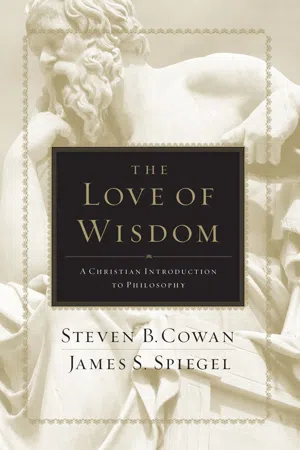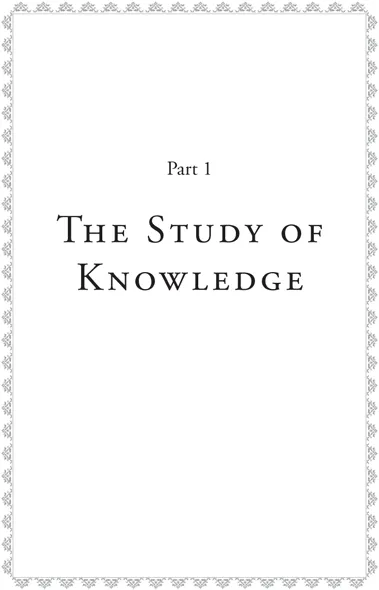![]()
![]()
Chapter One
LOGIC AND TRUTH:
WHAT IS TRUTH?
“The first and last thing required of
genius is the love of truth. “
—Goethe
1.1 The Science of Reasoning
1.1.1 The Laws of Thought
1.1.2 Arguments
1.1.3 Major Fallacies
1.2 Is Anything True?
1.2.1 Is It True That There Is No Truth?
1.2.2 What Is Truth
Glossary Terms
| Argument | Law of noncontradiction |
| Coherence theory of truth | Logic |
| Correspondence theory of truth | Objectivism (about truth) |
| Deduction | Pragmatic theory of truth |
| Fallacy | Relativism (about truth) |
| Induction | Syllogism |
| Law of excluded middle | Truth |
| Law of identity | |
At one point in Lewis Carroll's Alice's Adventures in Wonderland, Alice attends a tea party where she meets some strange characters: the March Hare, the Mad Hatter, and the Dormouse. During the tea party the following conversation takes place:
“You should say what you mean,” [said the March Hare to Alice].
“I do,” Alice hastily replied; “at least—at least I mean what I say—that's the same thing you know.”
“Not the same thing a bit!” said the Hatter. “Why, you might just as well say that ‘I see what I eat’ is the same thing as ‘I eat what I see’!”
“You might just as well say,” added the March Hare, “that ‘I like what I get’ is the same thing as ‘I get what I like’!”
“You might just as well say,” added the Dormouse, which seemed to be talking in its sleep, “that ‘I breathe when I sleep’ is the same thing as ‘I sleep when I breathe’!”
“It is the same thing with you,” said the Hatter, and here the conversation dropped.1
Carroll has given us here a humorous, though poignant, example of the importance of logic and the pursuit of truth. Indeed, this story illustrates the connection between truth and logic. If the philosopher is to pursue truth and discover the true worldview (as we discussed in the introduction), then logic is an essential tool. In this chapter, we will explain the basic principles of logic—the science of sound reasoning. Then we will examine the nature of truth itself, a question of special importance in our culture today.
§ 1.1 The Science of Reasoning
Logic is the primary tool of philosophers. In logic, the philosopher has a set of basic rules and principles for governing his thinking, for dictating when and how to draw conclusions from other things believed, and for evaluating the views of others. Logic, in other words, constitutes a science of reasoning. We will begin our discussion with the most fundamental logical principles.
1.1.1 The Laws of Thought
Basic to all logic are the three laws of thought (sometimes called the laws of logic).2 All the other principles of logic flow from and presuppose these three principles. One of these is the law of noncontradiction. This law simply states that no proposition can be both true and false at the same time and in the same sense. Each part of this law is crucial for avoiding misunderstanding. The law of noncontradiction does not assert that a proposition (i.e., a statement) cannot be true and false at different times. Obviously, the following statements can both be true so long as they are asserted at different points in time:
“Barack Obama is the current president of the United States.”
“Barack Obama is not the current president of the United States.”
If the first proposition were uttered in 2009, then it would be true. And if the second one were uttered in 2005, it would be true. All that the law of noncontradiction rules out is both statements being true at the same time. Likewise, the law of noncontradiction can allow that two statements can be both true and false even at the same time if the statements have different meanings. Consider these two statements:
“Al Gore is cold.”
“Al Gore is not cold.”
Both of these statements can be true even at the same time as long as the word “cold” means something different in each case. Suppose that, in the first statement, “cold” means emotionally cold (i.e., distant, aloof), while in the second statement, “cold” means physically cold (i.e, cold in temperature). In this case, obviously, both statements can be true simultaneously. All that the law of noncontradiction rules out is both statements being simultaneously true in the same sense.
Another law of logic is the law of excluded middle. According to this law, every proposition must be either true or false. The law excludes a third alternative. So, the proposition, “Barack Obama is the current U.S. president” is either true or false. It must be one or the other. There is no “middle ground” between truth and falsehood.
The law of identity is the third and most fundamental law of thought.3 This law states that every proposition is identical to itself. Or,put another way, if a proposition is true, then it is true. So, if it is true that Barack Obama is the U.S. president, then it is true that he is the president. At first blush, this law may seem so simple and obvious as to be hardly worth stating. However, some very interesting and important philosophical problems turn on the truth of this law. And the other two laws of thought are actually derived from this one. This is why it is the most basic of the logical laws.
Such are the basic laws of logic on which all other logical principles depend. Though some have challenged the necessary truth of these laws, they are indispensable for clear thinking.4
1.1.2 Arguments
Logic is primarily about the construction and evaluation of arguments. An argument is a set of propositions or statements that purports to prove something. As such, an argument has two parts: (1) the conclusion of the argument is that proposition which one is trying to prove, and (2) the premises of the argument are those propositions that provide reasons for accepting the conclusion. Let's look more closely at the nature of arguments and see how they are supposed to work.
Deduction and Induction
Arguments may be either deductive or inductive. Deduction is a kind of reasoning by which we draw inferences (i.e., conclusions) that are guaranteed by a set of premises. In a good deductive argument, the premises (if true) provide conclusive grounds for the conclusion. That is, the conclusion of a deductive argument follows from the premises with absolute certainty. Consider the following deductive argument:
All men are mortal.
Socrates is a man.
Therefore, Socrates is mortal.
A moment's reflection on this argument reveals that the conclusion follows from the premises of this argument. If the premises are true, then the conclusion cannot fail to be true.
Induction is a type of reasoning by which we infer conclusions that are likely, but not guaranteed, based on the premises. Inductive arguments establish their conclusions with only a degree of probability. The premises, that is, only imply that the conclusion is probable, not certain. Here is an example of an inductive argument:
Out of 1,000 people surveyed in Birmingham, Alabama,
70 percent agree that capital punishment is morally permissible.
Therefore, it is likely that approximately 70 percent of the
citizens of Birmingham, Alabama, agree that capital punishment is morally permissible.
Again, only a little reflection makes clear, even if the premise of this argument is true, that the conclusion is not certain. The premise makes the conclusion probable, but does not guarantee its truth. We all use inductive reasoning in many aspects of our daily lives, and we will examine inductive arguments at various points in this book. However, in the remainder of our discussion of logic, we will confine ourselves mostly to a discussion of deductive arguments.
Validity and Soundness
In evaluating deductive arguments, the first thing to consider is whether the argument is valid. The concept of validity applies to an argument when its conclusion follows logically from its premises. More precisely, a valid argument is one in which, if the premises are true, the conclusion must also be true. It is very important that the student of logic understand what validity does and does not imply. To say that an argument is valid is not to say that its conclusion is true. Nor is it to claim...

